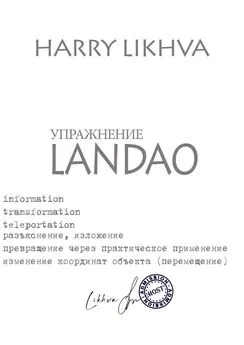Harry Turtledove - Give me back my Legions!
- Название:Give me back my Legions!
- Автор:
- Жанр:
- Издательство:неизвестно
- Год:неизвестен
- ISBN:нет данных
- Рейтинг:
- Избранное:Добавить в избранное
-
Отзывы:
-
Ваша оценка:
Harry Turtledove - Give me back my Legions! краткое содержание
Give me back my Legions! - читать онлайн бесплатно полную версию (весь текст целиком)
Интервал:
Закладка:
Towns had their advantages. He understood that. If you brought news to a town, you had to tell it only once, everybody in town, or in the market square, anyhow, would hear it at the same time. So would farmers who’d come into town to sell whatever they had, and then they would spread the news through the countryside.
Towns were . . . efficient. The word and the idea existed in Latin, but not in the Germans’ tongue. Roman armies were efficient, too. Arminius wished his own people grasped the concept, tor it was as much a weapon as the edge of the sword.
But the world was as it was, not as he wished it were. It he wanted to spread news, he couldn’t do it by traveling to a few towns. He had to go to one steadily alter another, talk with one farmer or minor chieftain after another, and persuade or cajole or jolly the man and the lesser followers at each place to his own way of thinking.
That way of thinking was simple enough. Very often, so was getting the Germans to his side. All he had to ask was, “Did the Romans collect taxes from you this past fall?”
More often than not, someone would say, or snarl, the word “Yes.” More often than not, that same man or someone else would curse the Romans.
Then Arminius would ask, “And do you want to pay taxes again next year?”
That commonly produced gasps of horror or fury or, most often, both commingled. “They were lucky to get it from me once - they caught me by surprise. Demons drag me down if they’ll do that again,” was an answer he heard again and again, in almost identical words.
“But they intend to,” he would say. It was no less than the truth, either. “They intend to, and they will try to kill you if you don’t let them rob you. What do you propose to do about that?”
People didn’t always say the same thing then. A lot of them didn’t believe him, or didn’t want to believe him - the notion was as far outside their ken as efficiency was. He had the advantage over them, though. He’d seen how things in Pannonia worked. He knew the Romans collected taxes there every year.
And he knew something else. “The Pannonians have given the Romans as much fight as thev ever wanted, and then some,” he would say to anyone who wanted to listen. “Are the Pannonians stronger than we are?”
“No!” Anyone he talked to would say that. The Germans were convinced they were the strongest folk in the world.
Arminius would nod and agree: “You’re right. I fought them. They’re strong enough, but they’re no stronger than we are. Are they braver?”
“No!” That question was guaranteed to affront any German ever born. His folk prided themselves on their courage.
And he would nod again. “That’s right - they’re not. They’re plenty brave - no doubt about it. But thev aren’t any braver than we are, either.
So if they’re brave enough to take on the Romans, why can’t we do the same?”
Hardly any Germans who’d been taxed by the Romans - -plundered by the Romans - saw any reason why they shouldn’t go to war against the legions. Arminius began to think his biggest problem would be holding the tribesmen back, not leading them forward. They wanted to march on the Rhine and burn every Roman fortification on this side of the river.
Strangely enough, much of the help he got in restraining the Germans came from Segestes and others who were pro-Roman. There weren’t that many of them, but they had influence beyond their numbers. One of the things the Romans did to win the land to their side was to get chieftains to go along with them. The chieftains, and the retinues of warriors they supported, helped sway the views of ordinary folk.
Quite a few of them told the Germans what an idiot Arminius was. He didn’t mind. Not many Germans who’d been taxed thought Arminius was an idiot. But the ordinary tribesmen did hesitate instead of rebelling too soon. Arminius found that blackly funny. Irony was one more concept he’d learned among his enemies.
And he had weapons against the pro-Roman chieftains, weapons they couldn’t match. “The Romans did this in Pannonia, too,” he would say. “I saw them do it. By the gods, I helped them do it so I could learn their ways. It is what they do whenever they enslave a new folk. Our old men will tell you they did the same thing in Gaul most of a lifetime ago. And now the people over there are their slaves.”
One graybeard said, “Well, those are only Gauls. We used to beat them, too. They aren’t so tough.”
“Let Quinctilius Varus keep collecting taxes from you, then,” Arminius replied. “Fifty years from now, some Roman master will say, ‘Well, those are only Germans. They aren’t so tough.’ “
People nodded, taking the point. The graybeard bit his lip, but he didn’t argue any more. Anyone who argued against Arminius soon wished he hadn’t.
Varus was drunk when a courier brought a letter from Augustus. In summer, the weather in this northerly part of the world got warm enough for cultured Romans to drink watered wine. During the winter, though, everybody took his neat to stoke the fires inside himself. Varus thought the habit barbarous till he tried it. When he found how well it worked, he became as enthusiastic as a convert to Judaism.
A servant gave the courier a cup of neat wine. “Much obliged,” the man said, and drank it down without blinking. How many winters up here had he gone through? Enough to get him used to strong wine, anyhow. The man led him away for something to eat.
“What does Augustus say, sir?” Aristocles asked.
“I don’t know.” Varus wondered if he wanted to know. But his right thumbnail lived a life of its own. It automatically dug under and flipped off the wax seal that held the sheet of papyrus closed. Varus held the letter out at arm’s length; his sight was lengthening. The same thing must have happened to Augustus, of course, but the letter was in his own hand - Varus recognized it at once.
When he didn’t go on right away, his pedisequus prompted him: “Well?” Aristocles was still sober, or close enough. He went on watering his wine, and wore a long, thick wool tunic and two pairs of socks for warmth.
“ ‘My dear Varus - I am glad to hear your first summer in Germany went well,’ “ Varus read, and breathed a sigh of relief that smoked in the air despite a charcoal brazier. He swigged from his goblet before going on: “‘You seem worried when you tell me what your tax collectors brought in.’ “
That made him swig again, drain the goblet dry, and fill it once more with the dipper plunged into the wine jar. He’d done his best not to sound worried, to treat the Roman soldiers’ sorry performance as nothing but routine. His best proved not good enough. Augustus hadn’t ruled the Roman world for more than a generation because he was blind to what lay below the surface.
Quinctilius Varus drank once more. His eves crossed. He knew he would have a thick head come morning, but morning seemed a million miles away. His slave made a wordless, impatient noise. Varus didn’t want to find out what Augustus said next, but knew he had no choice: “ ‘Lose no sleep over it. The idea is to get the barbarians used to paving taxes. Once they see thev have to, collecting more and more will grow easier year by year. Keep up the good work.’ “
“He really says that, sir?” Aristocles sounded astonished.
“He really does.” Varus couldn’t get angry at the Greek - he sounded astonished, too. Augustus was a notorious cheese-parer. He always had been. To have him write that he didn’t care how much Varus collected in Germany . . . proved he was also a statesman.
“What else does he say?” the pedisequus inquired.
“Who cares?” Varus said, and he laughed raucously. Augustus wasn’t angry at him! Next to that, everything else shrank to insignificance. But he finished the letter: “ ‘The weather here is tolerable - better, I daresay, than what you have. The harvest was good, for which I thank Ceres and the other gods. No danger of hunger this year. Tiberius seems to be bringing order to Pannonia at last, and that is also good news. I am as well as a man of my years can be. I hope the same holds true for you. Next year, you will go on breaking the Germans to the saddle.’“ Below that was nothing but a scrawled signature.
It sounded like Augustus: straightforward, to the point, with hardly a wasted word. The closing that got back to the business at hand was very-much Augustus’ style, too. He never left anyone in doubt about what he expected - unless doubt worked to his advantage, of course. Here, it didn’t.
“Let it snow!” Aristocles exclaimed. “We are warmed from the south, so let it snow as much as it please!”
“That’s right!” Varus said. “As long as Augustus is pleased, the whole world is pleased!” No matter how cold it was, it felt like spring already.
Varus was not a small man, not by Roman standards. All the same, he thought he’d get a crick in his neck from staring up at one enormous visiting German after another. This particular fellow, who gave his name as Masua, was even bigger than most: he stood several digits above six feet. He wore a bearskin cloak. With shaggy hair, unshaven cheeks and chin and upper lip, and blunt features, he looked like a bear himself.
“Sit down, sit down.” Varus waved him to a stool, not least so he wouldn’t need to keep looking up at him.
“I thank you, sir.” Masua spoke slow, deliberate, guttural Latin. The stool creaked under his weight. He was bear-wide through the shoulders, too. A servant brought in wine. Masua took a cup with murmured thanks. So did Varus. He didn’t mix in water, but he did sip cautiously. He didn’t want to get drunk so early. By the way Masua gulped, he didn’t care.
“You are one of Segestes’ men, you told my aides,” Varus said.
“That is right.” Masua’s big head bobbed up and down. “I am one of his sworn band. I fight for him and do what he needs. One of the things he needs now is someone to deliver you a message. He chose me.” Pride rang in the tremendous German’s voice.
“I see,” Varus said, though he didn’t, not yet. With luck, he would soon. “And this message is ... ?”
“This is message is, you are not to trust Arminius for any reason, sir,” Masua said. “He goes up and down in Germany. Everywhere he goes, he speaks against the Romans. He speaks against Roman rule beyond the Rhine.”
“I see,” Quinctilius Varus said again. “Have you heard Arminius say these things with your own ears?”
“No,” Masua answered. “I would not walk as far as I can spit to listen to that woman-stealing swinehound.”
That last had to be some German insult translated literally. Varus rather liked it. All the same, he went on, “Has Segestes heard Arminius say these things with his own ears?”
“Segestes would not walk as far as he could piss to listen to Arminius.” Masua paused, considering. “Segestes might walk far enough to piss on Arminius’ corpse. He might not even do that.”
In spite of himself, Varus had to smile. But he also had to ask an important question: “In that case, how do you know what Arminius is supposed to be saying? How does Segestes know?”
“Everyone knows what Arminius is saying,” Masua replied, as if to a half-witted child. Varus thought an oafish barbarian had no business taking that tone with him. No matter what he thought, the oafish barbarian went on, “Arminius makes no secret of it. Like I tell you, he goes up and down in Germany. He says what he says to anyone who will hear him. Many men do - too many men.”
Читать дальшеИнтервал:
Закладка:







